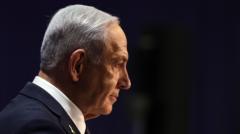Benjamin Netanyahu’s announcement of Eli Sharvit as the new Shin Bet chief has sparked controversy, raising questions about political influence over state institutions.
Netanyahu Appoints New Intelligence Chief Amid Supreme Court Standoff

Netanyahu Appoints New Intelligence Chief Amid Supreme Court Standoff
Tensions Rise as New Spy Agency Head Named Despite Legal Challenges
In a significant move that could lead to heightened tensions with the judiciary, Israeli Prime Minister Benjamin Netanyahu appointed Eli Sharvit as the new head of the Shin Bet, Israel’s domestic intelligence agency, on Monday. This decision surfaces despite an ongoing Supreme Court ruling that has temporarily halted the dismissal of the current chief, Ronen Bar.
Netanyahu's administration had already indicated earlier this month that a reshuffle was in order, with a clear decision to replace Bar as soon as a successor was identified. This latest appointment comes at a precarious time, as the Supreme Court is scheduled to hear arguments on April 8 regarding the legality of dismissing Bar, therefore, Sharvit's official induction may be postponed until then, avoiding an immediate constitutional crisis.
However, critics of Netanyahu fear that this movement indicates an alarming trend toward consolidating power in a manner that undermines democratic principles. The prime minister's justifications for Bar's ousting revolve around a purported breakdown of trust and alleged failures during the early hours of the Hamas attacks on October 7, 2023. Yet, skeptics believe that these reasons may merely provide a façade for a deeper political agenda.
Netanyahu has faced sharp criticism for alleged attempts to suppress state oversight and judiciary independence, particularly after passing a law that shifts the authority over the appointment of Supreme Court justices toward political hands. Additionally, there are efforts underway to dismiss Gali Baharav-Miara, the Attorney General, who has been vocally critical of Netanyahu's decisions and actions.
The political landscape in Israel remains turbulent, framing a narrative of escalating executive power and diminishing checks and balances. As citizens await the upcoming legal proceedings, the implications of these moves continue to stir controversy within the nation.
Netanyahu's administration had already indicated earlier this month that a reshuffle was in order, with a clear decision to replace Bar as soon as a successor was identified. This latest appointment comes at a precarious time, as the Supreme Court is scheduled to hear arguments on April 8 regarding the legality of dismissing Bar, therefore, Sharvit's official induction may be postponed until then, avoiding an immediate constitutional crisis.
However, critics of Netanyahu fear that this movement indicates an alarming trend toward consolidating power in a manner that undermines democratic principles. The prime minister's justifications for Bar's ousting revolve around a purported breakdown of trust and alleged failures during the early hours of the Hamas attacks on October 7, 2023. Yet, skeptics believe that these reasons may merely provide a façade for a deeper political agenda.
Netanyahu has faced sharp criticism for alleged attempts to suppress state oversight and judiciary independence, particularly after passing a law that shifts the authority over the appointment of Supreme Court justices toward political hands. Additionally, there are efforts underway to dismiss Gali Baharav-Miara, the Attorney General, who has been vocally critical of Netanyahu's decisions and actions.
The political landscape in Israel remains turbulent, framing a narrative of escalating executive power and diminishing checks and balances. As citizens await the upcoming legal proceedings, the implications of these moves continue to stir controversy within the nation.



















